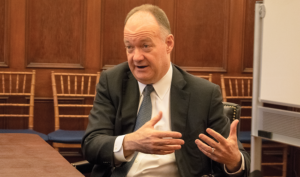Georgetown University signed onto an Dec. 21 amicus brief in a lawsuit challenging a recent immigration policy change that tightens regulations on visas for international students studying in the United States.
Under the new policy, unlawful presence begins as soon as a violation of the visa occurs rather than after a U.S. Citizenship and Immigration Services official or judge found a violation had occurred. Former visa holders who accrue more than 180 days of unlawful presence could be penalized with re-entry bans up to 10 years.

This policy change negatively affects students and the institutions they attend, according to the amicus brief.
“America will become a less attractive destination for international students and scholars, thus making it more difficult for American institutions to continue attracting and recruiting the best international talent,” the brief reads.
Georgetown joined 64 other U.S. universities and one university system board in signing the brief, which was submitted in the case brought against Secretary of the Department of Homeland Security Kirstjen Nielsen (SFS ’94). Guilford College, et al., v. Kirstjen Nielsen was filed in the U.S. District Court for the Middle District of North Carolina on Oct. 23.
Though not a party to the suit, Georgetown, in filing an amicus brief, is able offer its insight and express its strong interest in the matter. Other signatories of the brief include Princeton University, Massachusetts Institute of Technology and Duke University.
The policy change came after the DHS issued a Aug. 9 memorandum instructing the U.S. Citizenship and Immigration Services to alter the way it calculates unlawful presence of exchange students and international visitors on F, J or M visas. F visas allow international students to pursue a degree from a U.S. university, while J visas allow professors, researchers and students to visit the United States on cultural exchange programs. M visa holders can simply enter the United States multiple times as long as the visa has not expired.
President Donald Trump’s administration requested on Jan. 10 that the case be dismissed on the grounds that the plaintiffs themselves have not suffered any injury from the policy change.
The visa policy change, however, not only harms international students, but also institutions of higher education by affecting the universities’ accessibility to students from abroad, according to the brief.
“The effectiveness of visa programs depends on their stable and orderly administration,” the brief read. “The new DHS Policy Memorandum regarding the calculation of unlawful presence, however, introduces significant and destructive uncertainty.”
University President John J. DeGioia affirmed the value that international students bring to the Georgetown community and the United States in a Jan 9. news release.
“International students and scholars are vital members of our campus communities and important contributors to our nation,” DeGioia said. “The talents, perspectives, insights and passion to serve our world that they bring our campus communities benefits our nation and contributes to the common good that we all share.”
At least 2,149 international students attend Georgetown on F-1 and J-1 visas, according to the university. Over 3,000 international students are part of the Georgetown community, including those in optional practical training or in non-degree programs.
International students use their educations to benefit the domestic economy and are instrumental in increasing growth, the universities argue.
“The benefits of international study extend far beyond the academy, however, and reach the wider society in the form of significant economic and technological developments,” the brief says.
This is not the university’s first challenge to the Trump administration’s immigration policy. In fall 2017, Georgetown filed an amicus brief to the U.S. Supreme Court against Trump’s executive order that restricted travel from six predominantly Muslim countries. In defending the university’s position, DeGioia stressed the importance of international students and faculty who can bring invaluable experience and talent to the university.
“We are an institution that values the contributions of our international students, staff and faculty, and we are deeply committed to interreligious dialogue and providing a context in which members of all faith backgrounds are welcomed and encouraged to practice their faith,” DeGioia wrote in a letter to the Georgetown community Jan. 29, 2017.
Hoya Staff Writer Will Cassou contributed reporting.




















